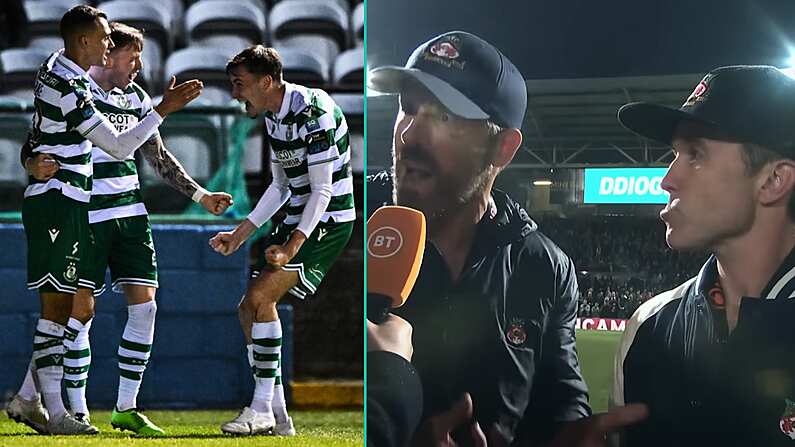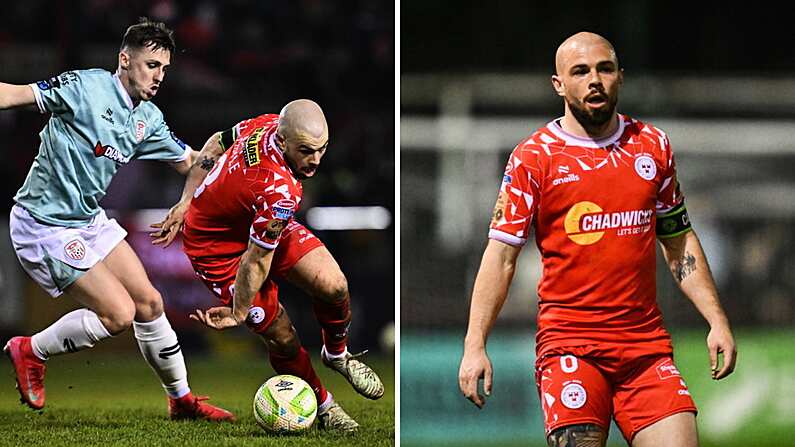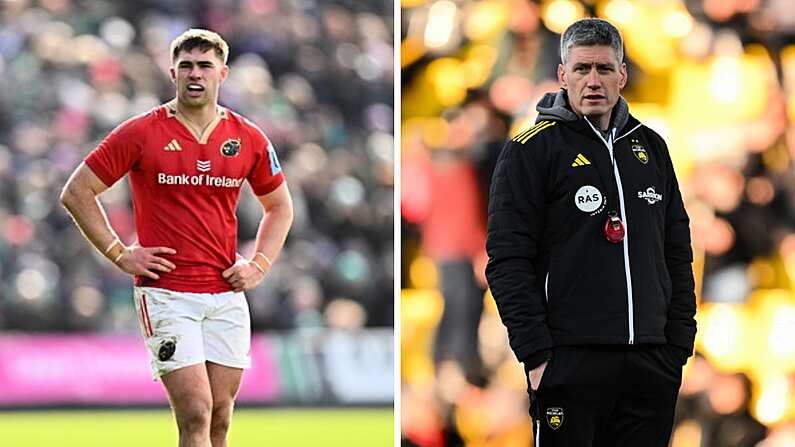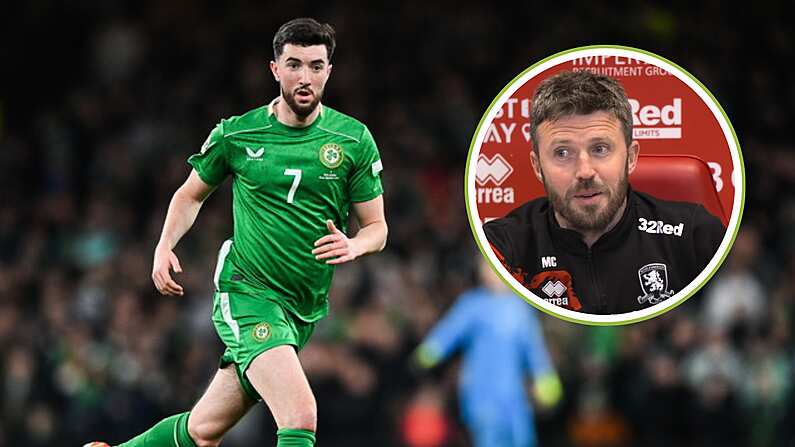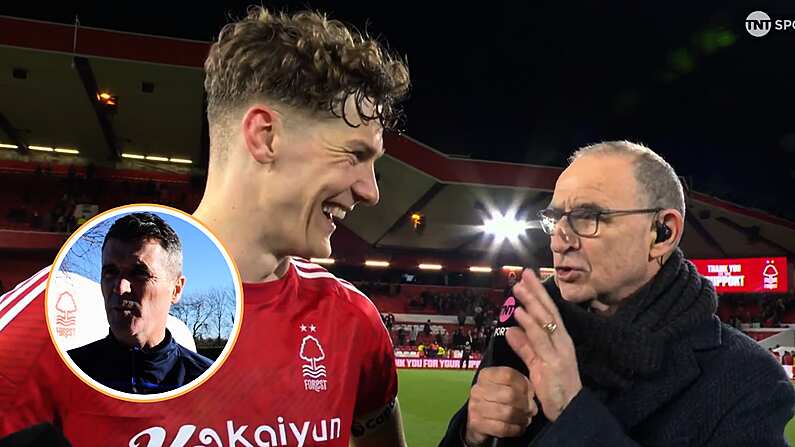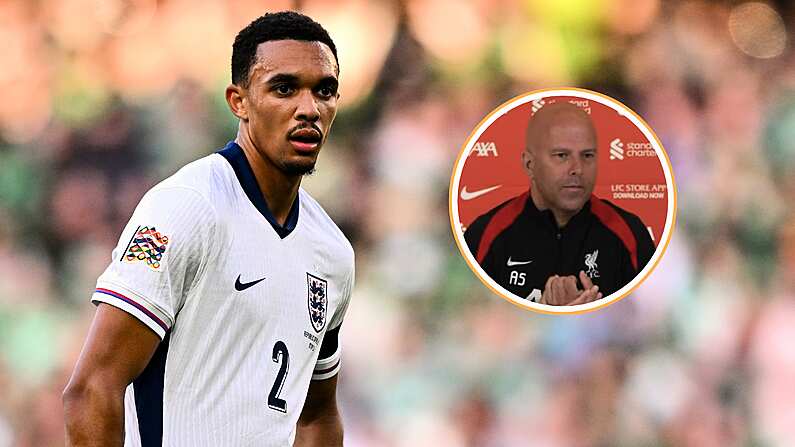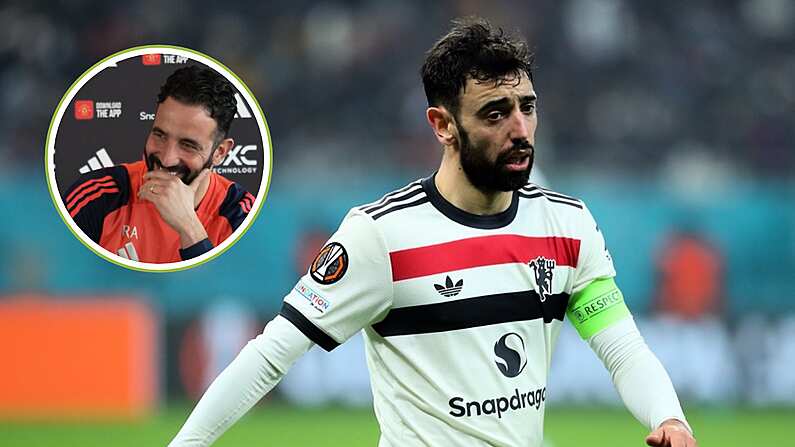The Scottish camp definitely knew that we needed to do it for Ireland. We obviously couldn't do anything for us, but we couldn't just go out there and play a normal game. The effort that night was absolutely phenomenal from everyone involved.
Pat Nevin
Jack Charlton was in a farm in Shropshire when he settled down to watch Scotland play Bulgaria (or Romania or someone like that) in a European qualifier in Sofia.
Ireland were sitting on top of the group but that was seen as merely an accident of scheduling.
They had played all their games and sat one point ahead of Bulgaria. Scotland meanwhile, had two games left but, unusually for that era, were already out of the running.
Every previous Irish qualification had ended in failure and it was no use getting one's hopes up for this one.
Bulgaria had won every home match they had played for the previous three and a half years. The Scots had been spanked 4-1 in Belgium and lost 1-0 to Ireland at Hampden.
GOODBYE TO DECENTSKINSMANSHIP
The campaign, dominated by talk of Jack Charlton's 'up and under almost Garryowen' style tactics, had already been filed away under the promising category, something from which to draw heart heading into the Italia 90 qualifiers.
It's predecessor, the 1986 qualification attempt, had been a fairly miserable one.
It was the fag end of the Eoin Hand era, and elimination was assured even earlier than usual. It was inevitable after Ireland were destroyed 3-0 in Copehagen in only the third match. The rest of qualifying, a la Steve Staunton in 2006-07, became almost exclusively concerned with the dead man walking that was Eoin Hand.
The campaign dribbled to a conclusion with Ireland being schooled by the Danes in Lansdowne Road, in a match that became paradoxically famous in later years for the small crowd that showed up.
Not long after he was sacked as Ireland manager, Hand met his chief tormentor in the media (we won't name him here but he used to play for Millwall) in Joys nightclub in Baggot Street, chatted cordially to him for a few minutes before, without warning, throwing a glass of wine in his face - like a scene out of Coronation Street.
Charlton was appointed Ireland manager in rather confusing circumstances early in 1986, beating out eleventh hour candidate Bob Paisley. He was informed of his new job by former Blackpool player and BBC co-commentator, Jimmy Armfield - an odd mechanism one would have thought, but the FAI couldn't get hold of him at the time.
When the ex-Millwall player, who had been a victim of Eoin Hand's wine-tossing ways, rose to challenge FAI President Des Casey on the selection process, Charlton, seated beside Casey, interjected, saying 'he doesn't have to answer that.' He then proceeded to call the ex-Millwall player 'a fucking troublemaker' before inviting him outside to discuss the matter further.
EURO '88 CAMPAIGN BEFORE SOFIA
Despite protestations to the contrary, officials acknowledge that the prospects of the Irish surviving the preliminaries have dwindled to almost nothing. To do so, they must win today; Scotland must take at least a point from Belgium at Hampden Park this evening, and then, most unlikely of all, the Scots must extract full points from their visit to Sofia on November 11th.
Irish Times, 14 Oct. 1988
Prior to the Bulgaria game at Lansdowne Road, the papers still rumbled with discontent over Ireland's alarmingly narrow 2-1 victory over Luxembourg in the previous match.
The campaign started well, with Ireland salvaging a late draw in Belgium thanks to a Liam Brady penalty. The Belgians were still afflicted by the familiar hangover that descends on teams who've done well at the World Cup. They had gone all the way to the semi-finals that summer, and so, for Ireland, grabbing a point against so exalted an opposition was seen as definite progress.
There followed a frustrating 0-0 draw at home to the Scots, and then the all important win at Hampden, thanks to a goal from Mark Lawrenson - a man whose breezy frankness about plumping for Ireland because England weren't picking him at the time was overlooked during the Mark Noble debate.
It was a familiar story in Sofia as Ireland lost 2-1 thanks to a contentious penalty awarded in the 82nd minute. Then there were the two unimpressive wins over Luxembourg, the second of which, in Dublin, sparked a hail of criticism.
https://www.youtube.com/watch?v=IHF-8jHov6s&feature=youtu.be
The identity of Jack's stoutest defender in the media in those early days will surprise anyone under the age of 30. It was the aforementioned 'fucking troublemaker.'
Before the campaign even began, Dunphy wrote that Charlton will 'try and achieve a balance between skill and aggression' and damned all the talk that Charlton would 'have Ireland kicking long hopeful balls in a crude attempt to emulate Wimbledon, Watford and Sheffield Wednesday, the New Barbarians of the English First Division.'
Dunphy regarded Jack's grim pragmatism and blunt insensitivity as an antidote to the years of amiable, soft-headed decentskinsmanship that prevailed before his arrival.
Just prior to the magnificently accomplished performance at home to Bulgaria, he loudly disputed the notion that qualification was all but gone from Ireland and once more praised Charlton for re-energising Irish football after 'the mess he inherited from Eoin Hand.'
RTE ran a show called 'The Sports File' about a decade ago, which just consisted of an hour length re-screening of Irish sporting victories - essentially some Saturday evening filler after the day's sport had ended but before the News and Tubridy Tonight came on.
One evening, they showed Ireland's 2-0 win over Bulgaria in October 1987. In a country that fixates on 1-1 victories, it was a revelation. It was a dreary day, the Lansdowne Road pitch was still decorated with rugby markings, and there were big chunks of concrete visible on the terraces.
Only 26, 000 showed up to watch one of Ireland's greatest ever displays in qualifying. McGrath and Moran stuck two second half goals and Liam Brady (who was sent off late in the game for retaliation) was sensational.
Bulgaria had reached the last 16 in Mexico and were unbeaten in qualifying up to that point. The same day, Scotland, who lost 4-1 in Brussels, did Ireland a favour by turning over the Belgians 2-0 in Hampden.
Between friendlies and qualifiers, Ireland won eight successive matches in 1987, still a record. The day before Scotland met Bulgaria in Sofia, Ireland slaughtered Israel 5-0 in a friendly in Dalymount Park. Jack Charlton promised Andy Roxburgh the obligatory bottle of champagne and threw in a box of Havana cigars as well.
But there was nothing they could do now.
'THE COUSINS'
As all Ireland's games were done, RTE had no big game to screen on international night. They decided, 'what the heck, we'll show the Bulgaria-Scotland game.' George Hamilton recalls the decision being met with approval from football fans.
There was less compunction about spending the money and doing things like that. I don't know that it would happen now, but it wasn't such a big deal simply because there was a chance. It would have been historic. There was a positive feeling about it, that RTE had gone to the trouble of televising this match, 'but we probably wont get anything out it' - that was the attitude.
Hamilton and editor Maurice Reidy bunked a lift on the Scottish team plane. Back then, players, officials, journalists, and assorted fans would have travelled together on the same plane. The RTE boys nestled in at the back of the plane, a chartered flight from Glasgow to Sofia.
There was no question that we were very welcome guests in this circumstance. And there was this, for want of a better word, fraternity expressed... We were a curiosity. But a nice one.
Scotland were well used to qualifying for major tournaments. They had been part of the previous four World Cups and went on to qualify for Italia 90 and Euro 92. And while it was a treacherous group with only one qualifying spot up for grabs, they were confident.
Of Ireland, there was a blithe expectation, inherited from history, that Scotland should have too much for them. But Pat Nevin knew that this talk was stale rubbish.
There was an expectation that we would qualify and Ireland hadn't ever qualified and were considered a weaker side. But people like me who played against their guys every week knew that that was a load of tosh! So, the players knew fine well that we were up against a right good side, whereas some journalists, in the days before the internet, might have thought, 'Ach, it's only Ireland, you'll beat them'. That wasn't the case in any of our minds.
Under new manager Roxburgh - the definition of an internal appointment - they endured a difficult start and by the time autumn 1987 rolled around, their fate was already sealed. They would not be going to Germany the following summer.
Heading to Sofia, one might have assumed they'd be listless, just seeing out their remaining fixtures. But they were desperate to win the game. And they were clued in to what it meant.
Nevin was on the bench that night. The Chelsea winger had played in several games earlier in the campaign. He felt as acutely as everyone else - and probably more than most - the desire to help Ireland.
Obviously a lot of Celtic supporters had links with Ireland. Even myself, I remember talking to my Dad, who wanted me choose Ireland above Scotland, when I was choosing who to play for. So we talked about it that we wanted to do the best and be honest about it. But definitely there was that little added extra bit where we knew we could do Ireland a favour and we were desperate to do that. The players definitely felt that.
Nevin, whose grandparents came from Naas, featured prominently in the game against Ireland at Hampden Park, where Scotland played particularly well, created a lot of chances but just couldn't score. After the game, he trudged disconsolately outside only to see his Scottish-born father standing there with a beaming smile on his face.
I was gutted because we played well, we'd played with two wingers, myself and Davie Cooper, we'd created a lot of chances. When I went out afterwards there was my Dad standing waiting for me smiling.
I said to him 'surely you weren't supporting Ireland?'
And he said, 'well, I'll go this far son, if you're going to get beaten by anyone, that's who to get beat by.'
The Celtic brigade were uncommonly eager to do something for Ireland in advance of Sofia. And they discussed it openly.
I know there would have been bathroom conversations between Clarkey (Steve Clarke) and myself and (Brian) McClair about that, because we would all have been Celtic's supporters as kids and we were very close friends anyway. So, definitely the three of us would have had those conversations.
This begs the inevitable question. If the Celtic clique were passionate about helping out 'the cousins', what of the other side of the equation? Would the Rangers leaning folk within the squad have had any misgivings about going the extra mile for the Republic of Ireland?
Funnily enough no. And a lot of the fans of those two clubs might expect it. It kind of just... wasn't there. It really wasn't there. If it was it went over my head and I never spotted it. And if you're brought up in the West of Scotland or the East end of Glasgow you have a pretty acute antenna for that kind of stuff.
'ABOVE AND BEYOND THE CALL OF DUTY'
Ray Houghton was sitting in his hotel room in Liverpool. He had just joined the club and hadn't found a permanent place yet. He wasn't hanging on the result of the Bulgaria-Scotland game.
The game wasn't on the network, which would have been screening England's 4-1 win in Yugoslavia that night, it was only available on the regional opt-out. Irish sports fans have had cause to curse the regional opt-out over the years, for giving them unwanted updates on how Crusaders and Linfield are getting on and being responsible for them knowing who Julian Symonds is.
No, the game was only available live to Scottish viewers on STV, ITV's regional opt-out service in Scotland. Houghton can't remember if teletext was a thing back then but even if it was he certainly wasn't checking it every few seconds. Scotland were 6/1 to win with most bookmakers. He didn't anticipate an upset.
I was expecting Bulgaria to win. I didn't fancy Scotland at all. It was never in my mind that they could win.
Mark Lawrenson was hanging around Dublin airport, awaiting a flight back to Liverpool. He had played the previous night in the demolition of little Israel. His flight was due out shortly after the game in Sofia began, but even so, he was invited into a private room in the airport so he could at least catch the first twenty minutes.
Despite his curiosity, he demurred.
I wanted to but I said to myself, ah no... I better not!
RTE gathered together John Giles, Maurice Setters, Mick McCarthy and Steve Staunton in a room which looked like a more downmarket version of the place where the BBC used to interview tennis players at Wimbledon - it looked like the smoking area of a pub before pubs had designated smoking areas.
The match kicked off at roughly 6.00 Irish time, Bulgaria being two hours ahead of Ireland.
Scotland began with six natural defenders in the starting line-up, Steve Clarke, Maurice Malpas, the captain Roy Aitken, Alex McLeish, Steve Nicol and Gary Gillespie. Attack wise, Paul McStay was relied upon for invention in midfield, with Graeme Sharp and Brian McClair up front. Ian Wilson and Jim Leighton in goal completed the line-up.
While the squad may have been heavy on Celtic supporters, it wasn't loaded down with Celtic players. This being a somewhat more democratic time in Scottish football, there was only two representatives from the Old Firm - Aitken and McStay. Three Rangers players were withdrawn in the days leading up to the game - Ian Durrant, Ally McCoist and Richard Gough, meaning there wasn't a single Rangers player in the starting line-up - though Gordon Durie, who was introduced with ten minutes left, went on to play for them, and McLeish and Sharp were definitely Rangers fans growing up.
There were three representatives from the, by then waning, 'New Firm' of Aberdeen and Dundee United - Leighton, McLeish and Malpas. The rest were based down south.
The game itself reads like a John Giles parable. The Bulgarians were nervy and the Scots were dogged. Teams are frequently made edgy by the realisation that a draw will do them. Bulgaria had the ball for most of the game, but rested on it, content with the knowledge that 0-0 was enough. Still they were a silky side and the Scots were made chase. Nevin remembers it being an energy sapping night for the players on the pitch.
It was a hard place to go. The effort near the end of the game, everybody was putting so much in, and a lot of players were knackered, really exhausted near the end of the game, but we were not going to give this up.
There are games in a campaign that all effort goes in that deserves to go in. You'd consider that the right thing, the professional thing, a lot of people do that but the above and beyond the call of duty stuff, maybe you don't get that, but you definitely got it that night.
ESCOCIA! ESCOCIA! ESCOCIA!
The Bulgarians grew more panicky as the game wore on. With three minutes of normal time remaining, the somewhat rotund Austrian referee (namesake of the then German chancellor) Helmut Kohl, played advantage after a comically violent challenge by a Bulgarian defender on Scotland substitute Gordon Durie. Just before he was cut down by the scything tackle, Durie had stabbed the ball into the path of Steve Nicol. Nicol cut inside and threaded a neat pass into the path of the substitute, Hearts forward Gary Mackay.
There was this incident way out on the far-side, Scotland were playing right to left (from the view of the TV camera) and the referee played an advantage. There was a cynical foul by the Bulgarian and the referee played an advantage and from it Scotland scored.
George Hamilton
The RTE coverage jerked back to Gilesy and Setters and McCarthy whooping and yahooing in their strange location. Gilesy had an excited, pumped up smile plastered on his face, but did his best to maintain his composure. Maurice, the most exuberant of the party, didn't bother and was gesturing, pointing and fisting the air.
Scotland continued to play with remarkable brio and assurance in the last few minutes. In the final minute, Brian McClair broke through the Bulgarian cover again but shot straight at the keeper. Mackay noted in an interview with Aidan Fitzmaurice years later that had McClair (the much higher profile player) scored, 'you would be interviewing Choccy instead.'
During the three or so minutes of injury time, George had cause to roar 'DANGER HERE!' after Sirakov found space on the edge of the box and sent a shot whooshing wide.
There was an eerie atmosphere at the final whistle - the disenchanted, tuneless whistling and that familiar air of dazed shock that greets a disastrous late sucker punch - except in that corner of the stadium where the Scottish supporters were congregated.
'Complete shock,' Hamilton says when asked to remember the reaction of the crowd. 'It was totally unexpected. The crowd was very subdued except among those Scots who happened to be there because they were delirious.'
(RTE)
Back in Liverpool, Ray Houghton was unaware of what had transpired in Sofia.
I do remember it was an Irish journalist who rang me. He was based in England and he rang me up. He must have been getting scores or whatever and he rang me to tell me they'd won.
I was amazed. I was jumping up and down on the bed at the time. I think I rang Aldo.
Mark Lawrenson only heard the score when landed back at his house in Liverpool and 'nearly hit the roof'. Kevin Moran was sitting in Manchester, watching England's game in Yugoslavia when the scoreline from Sofia flashed up on the screen.
Des Casey wasn't watching the game either. The man who was pivotal in appointing Jack Charlton as Ireland manager, was the UEFA delegate to the Portugal-Switzerland game in Oporto. Fifteen minutes before kick-off, he was out inspecting the playing surface with the referee and his officials when his two liaison officers from the Portuguese FA came scampering out on the pitch.
SENOR CASEY! SENOR CASEY! ESCOCIA! ESCOCIA! BULGARIA! BULGARIA!
Jack Charlton, meanwhile, holed up in the English West Midlands, settled down to watch the game, probably on Sportsnight on the BBC. The Scots had weathered a brief early flurry but were coping well when the phone rang. The guy on the other end said 'congratulations!' Jack said 'What for?' The man said 'For qualifying for Europe.' Jack responded 'No, no, it's only 0-0, it's on the telly, I'm watching it and there's only about a half an hour gone.' 'No, it's recorded. Scotland won 1-0.'
It remains the only time Ireland have topped a qualification group.
After the match, Andy Roxburgh congratulated Ireland but couldn't help remarking that he believed his team should be going to the Euros rather than the Republic.
In congratulating the Irish, I don't wish to sound mean when I say we lost to them in highly controversial circumstances at Hampden Park last February. We threw away our chances of qualifying by surrendering points we ought to have won, but while I would like to have taken the team to the European finals, there is at least consolation that we finished our programme in style.
The Bulgarian coach Christo Mladenov pronounced it 'the blackest day of my career' and offered no further comment.
(STV)
LIVE FROM THE BURLINGTON HOTEL
There was no partying in Sofia for either the Scottish players or the two RTE boys (or the Bulgarian supporters naturally). The Scottish players all had games to play that weekend. Hamilton and Reidy flew straight back with the same crew they flew over with the day before.
Any partying that was done was done on the plane. Just as a reminder that this was the 1980s, one half of Saint & Greavsie went down the back of the plane to celebrate with the Irish boys.
We flew back with Ian St. John. He was a guy I had known from my time in England. He came down and sat with us in the back row. He just thought this was brilliant, that Ireland had got through. And we spent the flight together, having a great old time.
They arrived back in Glasgow airport in the small hours of Thursday morning. An ex-Donegal minor footballer had stayed up most of the night to greet them when they arrived, though, according to Hamilton, Packie did not, as was reported, come bearing a bottle of champagne. 'Just a newspaper! (laughs)' Perhaps he made a beeline for Mackay with it before Hamilton arrived in the departures lounge.
It wasn't just Stephen Roche and Irish internationals and Meath footballers and Galway hurlers that dominated the RTE Sports Person of the Year awards that year. A special award was presented to Gary Mackay, who was sitting in a studio in Edinburgh. In the interests of public service we are calling on those in RTE archives department to do the right thing by the people of this country and put the damn thing up on youtube.
We got him a studio in Edinburgh and we made a special award to him. The show was live in Dublin. He was a Hearts player and he came into a studio in Edinburgh and I interviewed him live from the floor of the Burlington Hotel, or wherever we had the show that night, as one of the Irish sports stars of 1987.
Did he have much to say for himself?
He did! He was good! He entered into the spirit of it perfectly and was fully appreciative of what he had done.
Scottish football wasn't through with Sofia. Four years later, it was their turn to helplessly sit and watch events in the Bulgarian capital, as the home side held Romania to a draw allowing Scotland progress to Euro 92.
It seems rather quaint from the perspective of today, when footballers are painted as ultra-professional and comically disengaged, that the Scottish players, with nothing tangible to play for, would run themselves into the ground, motivated by the thought of getting Ireland to the European finals.
But Nevin for one, feels that instinct hasn't disappeared completely.
To be honest that's not completely gone. I was at the Poland-Scotland game and just at the end of it I'm sitting at the press box and there's a lot of Scottish journalists around and of course Ireland scored a goal in the last second. The whole press box leapt up and celebrated. But as they celebrated, they came back down and thought 'Oh dear, should we really be celebrating that?' But the natural thing is to celebrate it and say 'well we want them to do well.'
They don't feel the same about England definitely (laughs) and don't really have any massive passion for Wales either. They don't dislike Wales but there's no feeling there at all. But there is that link there with Ireland and the lads still have it.
See also: There are five other inductees in the Gary Mackay Hall Of Fame



